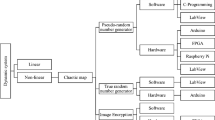Abstract
The linear complexity is a measure for the unpredictability of a sequence over a finite field and thus for its suitability in cryptography. In 2012, Diem introduced a new figure of merit for cryptographic sequences called expansion complexity. We study the relationship between linear complexity and expansion complexity. In particular, we show that for purely periodic sequences both figures of merit provide essentially the same quality test for a sufficiently long part of the sequence. However, if we study shorter parts of the period or nonperiodic sequences, then we can show, roughly speaking, that the expansion complexity provides a stronger test. We demonstrate this by analyzing a sequence of binomial coefficients modulo p. Finally, we establish a probabilistic result on the behavior of the expansion complexity of random sequences over a finite field.
Similar content being viewed by others
References
Berlekamp, E.R.: Algebraic Coding Theory. McGraw-Hill Book Co., New York - Toronto - London (1968)
Blackburn, S.R., Etzion, T., Paterson, K.G.: Permutation polynomials, de Bruijn sequences, and linear complexity. J. Combin. Theory Ser. A 76(1), 55–82 (1996)
Breiman, L.: Probability. SIAM, Philadelphia, PA (1992)
Diem, C.: On the use of expansion series for stream ciphers. LMS J. Comput. Math. 15, 326–340 (2012)
Jungnickel, D.: Finite Fields: Structure and Arithmetics. Bibliographisches Institut, Mannheim (1993)
Lidl, R., Niederreiter, H.: Finite Fields. Encyclopedia of Mathematics and Its Applications, 20. Addison-Wesley Publishing Company, Advanced Book Program, Reading, MA (1983)
Loève, M.: Probability Theory, 3rd edn. Van Nostrand, New York (1963)
Massey, J.L.: Shift-register synthesis and BCH decoding. IEEE Transactions on Information Theory IT-15, 122–127 (1969)
Meidl, W., Winterhof, A.: Linear complexity and polynomial degree of a function over a finite field. In: Finite Fields with Applications to Coding Theory, Cryptography and Related Areas (Oaxaca, 2001), pp 229–238. Springer, Berlin (2002)
Meidl, W., Winterhof, A.: On the linear complexity profile of explicit nonlinear pseudorandom numbers. Inform. Process. Lett. 85(1), 13–18 (2003)
Meidl, W., Winterhof, A.: Linear complexity of sequences and multisequences. In: Mullen, G.L., Panario, D. (eds.) Handbook of Finite Fields, pp 324–336. CRC Press, Boca Raton, FL (2013)
Rueppel, R.A.: Analysis and Design of Stream Ciphers. Communications and Control Engineering Series. Springer, Berlin (1986)
Acknowledgments
The authors wish to thank Claus Diem for a hint which led to an improvement of the constant in Theorem 4.
Author information
Authors and Affiliations
Corresponding author
Additional information
The first and the third author are partially supported by the Austrian Science Fund FWF Project F5511-N26 which is part of the Special Research Program ”Quasi-Monte Carlo Methods: Theory and Applications”.
Rights and permissions
About this article
Cite this article
Mérai, L., Niederreiter, H. & Winterhof, A. Expansion complexity and linear complexity of sequences over finite fields. Cryptogr. Commun. 9, 501–509 (2017). https://doi.org/10.1007/s12095-016-0189-2
Received:
Accepted:
Published:
Issue Date:
DOI: https://doi.org/10.1007/s12095-016-0189-2
Keywords
- Expansion complexity
- Linear complexity
- Pseudorandom sequences
- Binomial coefficients
- Finite fields
- Cryptography




